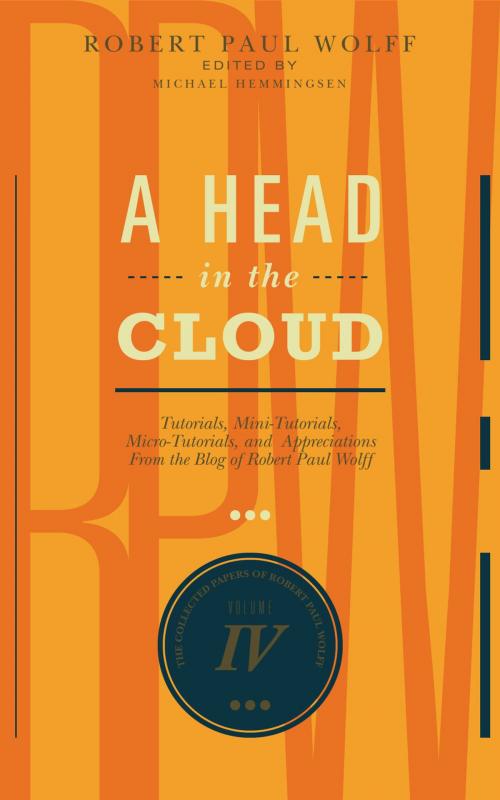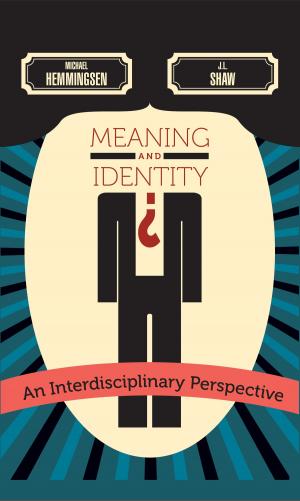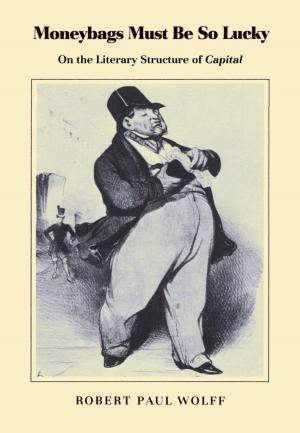A Head In The Cloud
Tutorials, Mini-Tutorials, Micro-Tutorials, and Appreciations From the Blog of Robert Paul Wolff
Nonfiction, Religion & Spirituality, Philosophy, Political| Author: | Robert Paul Wolff | ISBN: | 9780992257972 |
| Publisher: | Society for Philosophy & Culture | Publication: | May 20, 2013 |
| Imprint: | Language: | English |
| Author: | Robert Paul Wolff |
| ISBN: | 9780992257972 |
| Publisher: | Society for Philosophy & Culture |
| Publication: | May 20, 2013 |
| Imprint: | |
| Language: | English |
When Robert Paul Wolff retired in 2008 after a fifty-year career as a university professor, he was somewhat at a loss as to what to do. One of his sons said, "Why don't you start a blog, Dad?" And so, like hundreds of millions of others around the world, he did. The Philosopher's Stone has been running now for more than four years, and Wolff has poured hundreds of thousands of words into the blogosphere. His eight hundred page Autobiography, A Life in the Academy, was originally written day by day for his blog and was posted as it was written. But if the truth be told, Wolff is a teacher more than a blogger, and early on he devised a new format, the "Tutorial," that would permit him to continue what he loves best, explaining difficult ideas in simple and engaging ways to students, colleagues, and readers. In this volume, Wolff has brought together many of these extended explications that he wrote for his blog.
Some of the essays are full-scale Tutorials that appeared in fifteen, twenty, or more daily segments. Among these are "The Thought of Karl Marx," "The Thought of Sigmund Freud," and "The Study of Society." Some of Wolff's expositions were concluded more quickly, and he labeled these Mini-Tutorials or Micro-Tutorials. And from time to time, Wolff simply shared his enthusiasm for a particular book in what he called an Appreciation.
A sampling of the titles of the essays in this volume give some sense of the breadth of Wolff's interests: Afro-American Studies, Erich Auerbach's Mimesis, Ideological Critique, Max Weber's The Protestant Ethic and the Spirit of Capitalism, and Kierkegaard's Philosophical Fragments, among others.
When Robert Paul Wolff retired in 2008 after a fifty-year career as a university professor, he was somewhat at a loss as to what to do. One of his sons said, "Why don't you start a blog, Dad?" And so, like hundreds of millions of others around the world, he did. The Philosopher's Stone has been running now for more than four years, and Wolff has poured hundreds of thousands of words into the blogosphere. His eight hundred page Autobiography, A Life in the Academy, was originally written day by day for his blog and was posted as it was written. But if the truth be told, Wolff is a teacher more than a blogger, and early on he devised a new format, the "Tutorial," that would permit him to continue what he loves best, explaining difficult ideas in simple and engaging ways to students, colleagues, and readers. In this volume, Wolff has brought together many of these extended explications that he wrote for his blog.
Some of the essays are full-scale Tutorials that appeared in fifteen, twenty, or more daily segments. Among these are "The Thought of Karl Marx," "The Thought of Sigmund Freud," and "The Study of Society." Some of Wolff's expositions were concluded more quickly, and he labeled these Mini-Tutorials or Micro-Tutorials. And from time to time, Wolff simply shared his enthusiasm for a particular book in what he called an Appreciation.
A sampling of the titles of the essays in this volume give some sense of the breadth of Wolff's interests: Afro-American Studies, Erich Auerbach's Mimesis, Ideological Critique, Max Weber's The Protestant Ethic and the Spirit of Capitalism, and Kierkegaard's Philosophical Fragments, among others.















